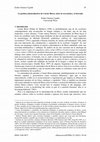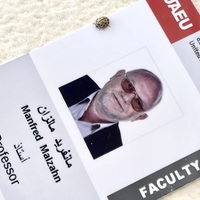Papers by Esther Gimeno Ugalde

Quaderns, Apr 26, 2024
Este artículo analiza el posicionamiento de João de Castro Osório en relación con el papel que oc... more Este artículo analiza el posicionamiento de João de Castro Osório en relación con el papel que ocupan para la literatura portuguesa las obras de escritores lusos que adoptaron el castellano como lengua literaria. De inclinación nacionalista y vinculado al régimen salazarista, este intelectual portugués abordó dicha cuestión en varias publicaciones, especialmente en el Florilégio das Poesías Portuguesas Escritas em Castelhano e Restituidas à Língua Nacional (1942), obra con la que se propuso llevar a cabo una labor de «restitución» que consistía en la traducción al portugués de una selección de poemas escritos originalmente en lengua castellana. En el extenso estudio introductorio que precede a este florilegio, Osório defendió su decisión de «restituir» estos textos que, a su entender, estaban estrechamente ligados a Portugal y pertenecían a la literatura portuguesa pese a haberse escrito en castellano. Tras una breve introducción, este artículo se divide en dos partes: una primera dedicada al llamado «bilingüismo luso-español» y a la posición incómoda que los autores translingües de los siglos xv-xvii han ocupado en el modelo historiográfico «nacional», y una segunda que profundiza en la centralidad de la traducción para el proceso renacionalizador de Osório.
Quaderns, Apr 26, 2024
En esta entrevista, la escritora gallega y especialista en autotraducción literaria rexina rodríg... more En esta entrevista, la escritora gallega y especialista en autotraducción literaria rexina rodríguez Vega conversa con Esther Gimeno Ugalde (Universidad de Viena) sobre la práctica de autotraducción y el papel de esta en la interacción entre las diferentes literaturas del Estado español. A partir de la experiencia autotraductora con tres de sus novelas (Cardumen, Dark Butterfly y Nadie duerme), rodríguez Vega arroja luz sobre la inherente "reescritura" que conlleva el traslado de una lengua a otra, la complejidad del proceso editorial y la constante negociación del autor-traductor con editores, correctores de estilo, etc. También reflexiona sobre las tensiones y contradicciones que experimentan los escritores bilingües como ella en el proceso de desdoblamiento que supone traducir un texto propio.
Entrevista a Josep Maria Forn, director, guionista i productor de cinema català: (Barcelona, 18 de juny de 2013)
Zeitschrift für Katalanistik: Revista d'Estudis Catalans, 2014
Keine Zusammenfassung vorhanden
Entrevista a Judith Colell, directora de cinema i vicepresidenta segona de l’Academia de las Artes y las Ciencias Cinematográficas de España: (Barcelona, 18 de juny de 2013)
Zeitschrift für Katalanistik: Revista d'Estudis Catalans, 2014
Introduction Special Section. Writing and Translating within Iberian Literatures
Rassegna iberistica, Dec 19, 2023

Estudios ibéricos online: El futuro de las iniciativas virtuales.
International Journal of Iberian Studies , 2023
Informe del encuentro en la sede del Instituto Cervantes (Madrid, 24 de octubre 2022).
In its thi... more Informe del encuentro en la sede del Instituto Cervantes (Madrid, 24 de octubre 2022).
In its third year of existence, Pleibéricos, an online platform focused on launching and promoting new books in the field of Iberian ṣtudies, held an event at the headquarters of the Cervantes Institute in Madrid on 24 October 2022. The aim of this first in-person meeting was to start conversations with other initiatives in the field that, like Pleibéricos, were founded during the COVID-19 pandemic or that had to move their operations online or adopt a hybrid format during that time. The founders and coordinators of the following six platforms talked about their projects: the online research seminar series Polibéricos, Edinburgh Spanish Film Festival (ESFF – to represent hybrid formats in the creative sector), the Spanish-language podcast New Books Network and the conferences Conversations on Iberian Studies: Challenges and Opportunities (CISCO) and Association for Contemporary Iberian Studies (ACIS). They placed special emphasis on the advantages and challenges of the online and hybrid formats and how to incorporate these new experiences, technologies and skills into a post-pandemic context. The event concluded with a roundtable discussion and some concluding remarks by a guest respondent. This meeting was made possible with the support of a Hispanex grant awarded by the Spanish Ministry of Culture and Sport.
Rassegna iberistica, Vol. 46, Num. 120, 2023
Introduction to the issue.
Journal for Romance Studies, 2023
Cinema de migração em língua portuguesa

Quaderns. Revista de traducció
Este ensayo sostiene que «Nota al pie» de Rodolfo Walsh, ejemplo precursor de la llamada «transfi... more Este ensayo sostiene que «Nota al pie» de Rodolfo Walsh, ejemplo precursor de la llamada «transficción», puede interpretarse como una forma de resistencia a la noción de la traducción como actividad literaria secundaria o «de segunda clase», a la vez que invita a repensar la posición marginal del traductor en favor de su papel activo como agente del proceso creativo de escritura. Mediante el uso subversivo de la nota al pie, el traductor-narrador de este cuento se apropia de la autoridad discursiva para poner en cuestionamiento la tradicional lógica jerárquica entre «texto principal» y «margen inferior». Aunque lo haga de forma póstuma, el protagonista del relato consigue su ansiada visibilidad, demostrando que la traducción es también una forma de (re)escritura, pues no en vano su nota es clave para realizar una lectura «completa», no parcial, de la ficción que el lector tiene entre sus manos, forzándole a una lectura a contrapelo del supuesto «texto principal».
Bilingüisme i diglòssia al cinema català contemporani: "El coronel Macià" (Josep Maria Forn) i "Salvador" (Manuel Huerga)
Revista Internacional de Catalanística = Journal of Catalan Studies, 2011
Journal for Catalan Studies, 2011

Quaderns. Revista de Traducció, 30, 2023
Este ensayo sostiene que «Nota al pie», de Rodolfo Walsh, ejemplo precursor de la llamada «transf... more Este ensayo sostiene que «Nota al pie», de Rodolfo Walsh, ejemplo precursor de la llamada «transficción», puede interpretarse como una forma de resistencia a la noción de la traducción como actividad literaria secundaria o «de segunda clase», a la vez que invita a repensar la posición marginal del traductor en favor de su papel activo como agente del proceso creativo de escritura. Mediante el uso subversivo de la nota al pie, el traductor-narrador de este cuento se apropia de la autoridad discursiva para poner en cuestionamiento la tradicional lógica jerárquica entre «texto principal» y «margen inferior». Aunque lo haga de forma póstuma, el protagonista del relato consigue su ansiada visibilidad, demostrando que la traducción es también una forma de (re)escritura, pues no en vano su nota es clave para realizar una lectura «completa», no parcial, de la ficción que el lector tiene entre sus manos, forzándole a una lectura a contrapelo del supuesto «texto principal».

eHumanista/IVITRA , 2023
Este ensayo explora la práctica autotraductiva de Carme Riera como una actividad literaria multif... more Este ensayo explora la práctica autotraductiva de Carme Riera como una actividad literaria multifacética y ambigua. La lectura estereoscópica de algunos textos de la antología de relatos Contra l’amor en companyia i altres relats / Contra el amor en compañía y otros relatos revela una poética autotraductiva a caballo entre la re-escritura creativa y la re-escritura geopolítica. Como se mostrará, la continua negociación entre la recreación y el borrado constituye un rasgo definidor de la obra rieriana en español, a la vez que posibilita su reconocimiento como autora española.
--
This essay explores Carme Riera’s self-translation practice as a multifaceted and ambiguous literary activity. The stereoscopic reading of some texts from the short stories’ anthology Contra l’amor en companyia i altres relats / Contra el amor en compañía y otros relatos reveals a self-translation poetics halfway between creative rewriting and geopolitical rewriting. As it will be shown, the continuous negotiation between recreation and effacement constitutes a defining feature of Riera’s work in Spanish, while makes it possible for her to be recognized as a Spanish author.
Catalan Studies in the United States
Estudios del Observatorio/Observatorio Studies
The purpose of this report is to map Catalan Studies programs in the United States and examine th... more The purpose of this report is to map Catalan Studies programs in the United States and examine the field’s current status within U.S. academia. Accompanied by a brief historical introduction, this overview is based on a triangulation of information from several different sources: (a) the annual reports of the Institut Ramon Llull (2010–17), which is the main institution that promotes Catalan Studies and culture abroad; (b) a questionnaire intended for U.S. universities that have a connection with Catalan Studies, through research and/or teaching; (c) information from the NACS (North American Catalan Society); and (d) a bibliography of secondary sources related to the field.
Panorama de los Estudios Catalanes en los Estados Unidos
Informes del Observatorio / Observatorio Reports
El presente informe se propone cartografiar los Estudios Catalanes en los Estados Unidos y examin... more El presente informe se propone cartografiar los Estudios Catalanes en los Estados Unidos y examinar su situación actual en el contexto académico del país. Acompañada de una breve introducción histórica, esta visión panorámica se establece a partir de la triangulación de datos obtenidos a través de distintas fuentes: (a) las memorias académicas del Institut Ramon Llull (2010-2017)—principal institución promotora de los Estudios Catalanes y la cultura catalana en el exterior—; (b) un cuestionario dirigido a universidades estadounidenses relacionadas con esta disciplina, bien sea a través de su docencia y/o investigación; (c) informaciones de la NACS (North American Catalan Society) y (d) bibliografía secundaria.
Ripensare la penisola iberica come zona di traduzione
Studi Iberici. Dialoghi dall’Italia, 2021
This contribution aims to outline the links between Iberian Studies and Translation Studies, seek... more This contribution aims to outline the links between Iberian Studies and Translation Studies, seek new points of connection and reflect on the advantages of a more intense disciplinary approach. This chapter contends that the Spatial Turn, that is, the growing concern for space and the new ways of understanding it from the social sciences and the humanities, has had important epistemological and methodological repercussions in Iberian Studies and also, although to a lesser extent, in Translation Studies, making space a common element that enables and justifies a closer dialogue between these disciplines.
Traducción de la novela catalana en el Portugal del siglo XXI
Die internationale Rezeption der Literaturen Spaniens: Beiträge zur Kulturtransferforschung, 2021, ISBN 978-3-7329-0740-3, págs. 121-160, 2021
Three Experiences in Video-Conferencing with Native Speakers of Spanish and French
NECTFL Review, Dec 1, 2017
COSTA, Joan. The Architect of Modern Catalan. Pompeu Fabra (1868-1948)











Uploads
Papers by Esther Gimeno Ugalde
In its third year of existence, Pleibéricos, an online platform focused on launching and promoting new books in the field of Iberian ṣtudies, held an event at the headquarters of the Cervantes Institute in Madrid on 24 October 2022. The aim of this first in-person meeting was to start conversations with other initiatives in the field that, like Pleibéricos, were founded during the COVID-19 pandemic or that had to move their operations online or adopt a hybrid format during that time. The founders and coordinators of the following six platforms talked about their projects: the online research seminar series Polibéricos, Edinburgh Spanish Film Festival (ESFF – to represent hybrid formats in the creative sector), the Spanish-language podcast New Books Network and the conferences Conversations on Iberian Studies: Challenges and Opportunities (CISCO) and Association for Contemporary Iberian Studies (ACIS). They placed special emphasis on the advantages and challenges of the online and hybrid formats and how to incorporate these new experiences, technologies and skills into a post-pandemic context. The event concluded with a roundtable discussion and some concluding remarks by a guest respondent. This meeting was made possible with the support of a Hispanex grant awarded by the Spanish Ministry of Culture and Sport.
--
This essay explores Carme Riera’s self-translation practice as a multifaceted and ambiguous literary activity. The stereoscopic reading of some texts from the short stories’ anthology Contra l’amor en companyia i altres relats / Contra el amor en compañía y otros relatos reveals a self-translation poetics halfway between creative rewriting and geopolitical rewriting. As it will be shown, the continuous negotiation between recreation and effacement constitutes a defining feature of Riera’s work in Spanish, while makes it possible for her to be recognized as a Spanish author.
In its third year of existence, Pleibéricos, an online platform focused on launching and promoting new books in the field of Iberian ṣtudies, held an event at the headquarters of the Cervantes Institute in Madrid on 24 October 2022. The aim of this first in-person meeting was to start conversations with other initiatives in the field that, like Pleibéricos, were founded during the COVID-19 pandemic or that had to move their operations online or adopt a hybrid format during that time. The founders and coordinators of the following six platforms talked about their projects: the online research seminar series Polibéricos, Edinburgh Spanish Film Festival (ESFF – to represent hybrid formats in the creative sector), the Spanish-language podcast New Books Network and the conferences Conversations on Iberian Studies: Challenges and Opportunities (CISCO) and Association for Contemporary Iberian Studies (ACIS). They placed special emphasis on the advantages and challenges of the online and hybrid formats and how to incorporate these new experiences, technologies and skills into a post-pandemic context. The event concluded with a roundtable discussion and some concluding remarks by a guest respondent. This meeting was made possible with the support of a Hispanex grant awarded by the Spanish Ministry of Culture and Sport.
--
This essay explores Carme Riera’s self-translation practice as a multifaceted and ambiguous literary activity. The stereoscopic reading of some texts from the short stories’ anthology Contra l’amor en companyia i altres relats / Contra el amor en compañía y otros relatos reveals a self-translation poetics halfway between creative rewriting and geopolitical rewriting. As it will be shown, the continuous negotiation between recreation and effacement constitutes a defining feature of Riera’s work in Spanish, while makes it possible for her to be recognized as a Spanish author.
on the dynamics of linguistic diversity and multifaceted literary translation flows
taking place across the Iberian Peninsula. Drawing on cutting-edge theoretical
perspectives and on a historically diverse body of case studies, the volume’s
16 chapters explore the key role of translation in shaping inter-literary relations
and cultural identities within Iberia. Mary Louise Pratt’s contact zone metaphor
is used as an overarching concept to approach Iberia as a translation(al)
space where languages and cultural systems (Basque, Catalan, Galician,
Portuguese, and Spanish) set up relationships either of conflict, coercion, and
resistance or of collaboration, hospitality, and solidarity.
In bringing together a variety of essays by multilingual scholars whose
conceptual and empirical research places itself at the intersection of translation
and literary Iberian studies, the book opens up a new interdisciplinary field
of enquiry: Iberian translation studies. This allows for a renewed study
of canonical authors such as Joan Maragall, Fernando Pessoa, Camilo
José Cela, and Bernardo Atxaga, and calls attention to emerging bilingual
contemporary voices. In addition to addressing understudied genres (the
entremez and the picaresque novel) and the phenomena of self-translation,
indirect translation, and collaborative translation, the book provides fresh
insights into Iberian cultural agents, mediators, and institutions.
-Cholas, birlochas y jailones: subalternidad y nuevos agenciamientos en Zona Sur (2009) de Juan Carlos Valdivia (Esther Gimeno Ugalde)
by Esther Gimeno Ugalde
un área hasta ahora poco explorada.
El objetivo del proyecto IStReS es reunir, a través de una base de datos relacional, la bibliografía académica del campo de los Estudios Ibéricos producida durante las últimas dos décadas, es decir, en el periodo en el que el campo ha alcanzado un mayor grado de desarrollo y reconocimiento científico e institucional. Esta base de datos incluye aquellas referencias bibliográficas que, de acuerdo con la definición más extendida de los Estudios Ibéricos, analizan las relaciones policéntricas entre diversas culturas de la Península Ibérica en diferentes momentos históricos.
A su vez, esta base de datos se ofrece al público a través de una web que contiene informaciones sobre el propio proyecto, sobre actividades
relacionadas con el campo de los Estudios Ibéricos, y un directorio de especialistas del campo en que se recogen sus áreas de interés y sus
publicaciones más relevantes.
-A database that collects and systematizes a comprehensive, relational bibliography of publications produced in the last two decades in multiple languages —including every Iberian language— that deal with the polycentric relationships between the different cultures and literatures of the Peninsula throughout history;
-A Who is who section, destined to highlight the most relevant scholars and their contribution to the field;
-A News section that provides updated information related to the field of Iberian Studies such as conferences, symposia, calls for papers, recent publications, etc.
with regards to the diverse disciplines that make it up. After a brief discussion of the differences and continuities between Iberian Studies, Peninsular hispanism and Portuguese/Luso-Brazilian Studies, the chapter focuses on the relationship between Catalan, Basque, and Galician Studies and the Iberian epistemological framework. Through a review of various published works that have reflected on how these fields might fit within
the Iberian ‘model’, the essay lays out, through a critical lens, the possibilities, limitations, and challenges of this new comparative field with regards to the aforementioned disciplines.